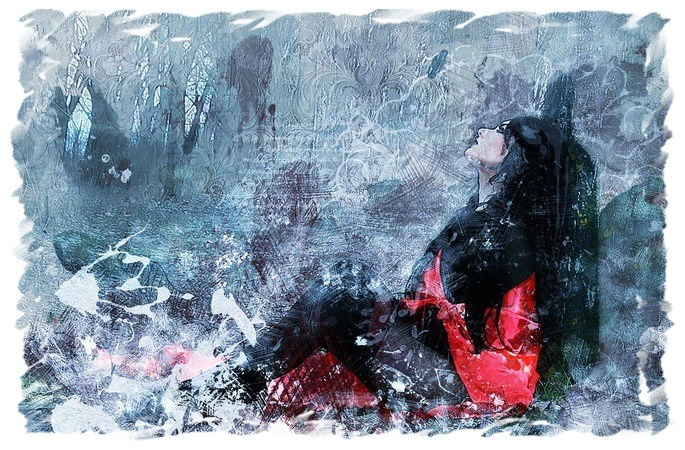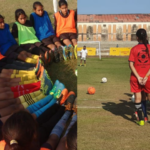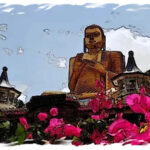Mortality isn’t something you think about when you’re seven. Even when your Dadaji dies the year you turn seven. For the rest of your life, you will remember this kind short-sighted man with nausea and outrage. Nausea because he was the first dead person you ever saw, and outrage because your father was so angry. He became an elder before his time; his father’s death would always be an inconvenience. And all through the rest of your childhood, you will know this.
Nor is mortality a factor when you are seventeen and lose another grandparent. Nanima this time – a beautiful gentlewoman bent over household chores, looking up with an absent smile when the grandchildren arrive. There is always food and laughter when you visit. You used to time your visits to coincide with lunches and dinners and she always gave more, more. Now she lies helpless on your old bed. Her death makes you grow up, you think. You are there, holding her hand, looking into her eyes as they lose light and you think you can handle this with grace. At seventeen, with an assurance you will never have again, you know your own life will be short. You think you’ll be lucky to make it to forty and decide you should never marry or have children.
When you marry, become a mother and find something you love as a job, those early memories of doom fade. In your twenties and thirties, you don’t have time. You are busy getting on with the business and trudge of life. And in your forties, you get a second chance at love and you know it’s all been worth it; how would you recognise this joy if you always had it? You forget many things. You have so much catching up to do. For a while, you are submerged in selfhood and the regard of a good man.
The reminder comes in the shape of a scary beast inside you that you didn’t know you were nurturing. A swift brutal reminder – out of nowhere. You go for a routine check with a medical professional and emerge with an altered reality. A diagnosis and the word ‘malignant’ following you about like a shadow. You think of the time you’ve spent daydreaming, fashioning stories, smiling at small publication wins, shrugging off multiple rejections. What were you thinking? How did you forget your own mortality?
You wonder about life in multiples of tens and sevens and think maybe those early events are significant. You think back obsessively to twenty-seven and thirty-seven and forty-seven and try to recall if anything happened then. Did someone die? Did you forget? You were so poor when you were twenty-seven and so desperate at thirty-seven, it is possible you didn’t notice death.
You tell yourself those two early events are coincidences because life doesn’t neatly offer you the evidence you crave but do not really want. Everyone loses someone. Grandparents and parents die in the natural order of things. Then your father dies, the one who was never going to, the one making plans to visit your brother, the one so fierce about living. So demanding. So expectant. You try to calm the fierce beast inside you that seeks answers in all the wrong places. There are no roadmaps to where you find yourself at this moment. This wasn’t inevitable. This wasn’t predictable. There was nothing you could have done to prevent it. You must submit to this new reality.
Friends and health professionals tell you what they think is helpful. Some say you are lucky. Some say you will get through this. Some agree with you when you say how scary this is and how incredibly shitty that it is your turn now. And none of it helps. Not one bit. Because you still carry the beast inside your body and in your heart and in your head. You try to make friends with the beast to get to know him.
You feel you don’t really know your body if this creature has made it his home. All you know is that they, the professionals, will try and rid you of him. They’ve seen it all before – hundreds of times. They remind you of all the women you know who have come through this. The power of surviving will enhance you. Ah, the platitudes – the emergence with flying colours. Because this was some necessary exam you didn’t know about.
You would have prepared if you’d expected it. You don’t know how but feel sure some preparation might have been in order. You think back on the body and the life you’ve led before the beast arrived and wonder if you could have done anything differently. You think about bargains. Promises. Abjectness.
But you know you won’t go back to what you were before. Before this man and this child you love more than you have words for, came along and filled you up. You won’t go back to being scared. You have been without fear for so long you didn’t recognise it when it came along to remind you of mortality. They taught you to be yourself without apology. Showed you the world in the strength of their arms when they hugged you. You still have this. And if you have nothing else, they are enough.
They have always been enough. Even when they urged you to go after whatever you thought was important, you knew they were all you ever needed. Maybe the beast will decide if you have more years with them or not. You want more years with them, more multiples of life in tens and sevens. More hugs, laughs, shared meals. So you quit bargaining with the beast and you sit with this man and this woman and love them. You hope they know why you don’t say much when you’re with them. You hope they know they have always been enough.



